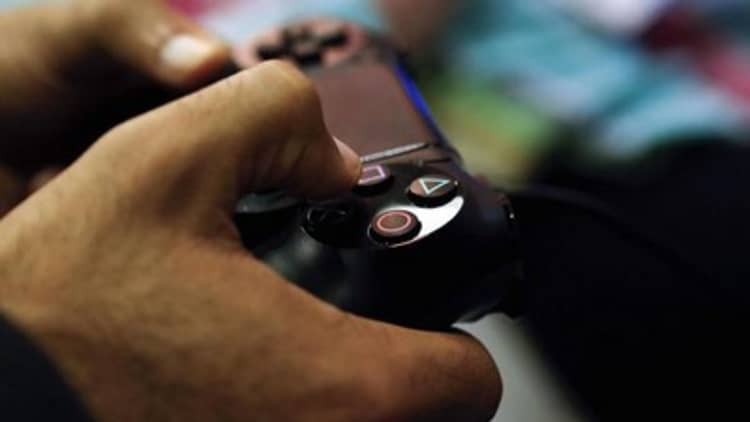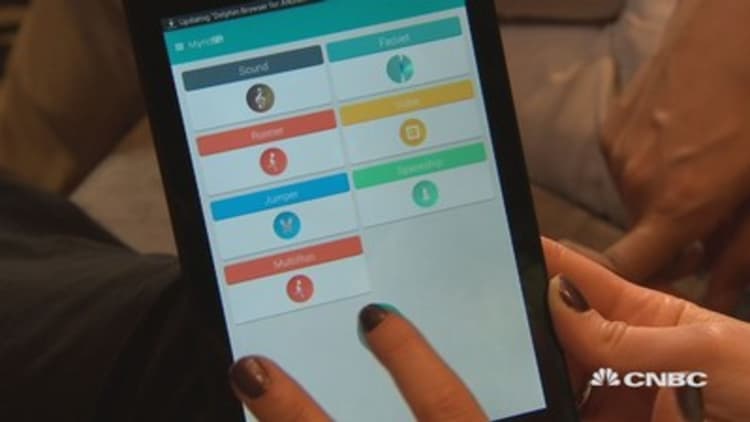In a small studio in Manhattan, the video game industry veterans at start-up TURBO Studios are busily working to release their first title this year.
Baked into the underpinnings of that project is a loftier goal. Founder Yohei Ishii and his team want to change the way users play mobile games. By trying to bring the immersive experience and high production value of console and personal computer (PC) gaming to mobile, they aim to create lasting hits.
"We're looking at our games to not last for just years, but hopefully decades. That's our goal. That's our vision," Ishii told CNBC.
The market for mobile gaming is hot, and getting hotter. According to video game research firm Newzoo, the migration from computers and consoles to tablets and smartphones sent worldwide mobile game revenues surging more than 40 percent in 2014 versus the year prior, hitting $25 billion.
With that in mind, TURBO Studios is just one developer aiming to build so-called core games for mobile devices. However, their task won't be easy. Traditional mobile hit makers are struggling to grow profit margins in the face of soaring user acquisition costs and crowded app stores. The new wave of developers believes it can avoid the boom-and-bust trend that has dominated mobile gaming, largely by building communities of intensely loyal core players.
Read More Mobile gamemakers face a test of survival
"There's sort of a third generation of mobile game developers emerging, and it's really about relationships at that point," said Joost Van Dreunen, founder and CEO of digital gaming analysis firm SuperData Research.
This new breed of developers is not just targeting serious gamers, he said. It also includes companies such as "Kim Kardashian: Hollywood" maker Glu Mobile, which has found success with titles that leverage name recognition and social media clout to reduce the cost of acquiring users.
As Van Dreunen explained, the common thread is that these companies operate more like traditional game developers. They recruit talent with highly specialized skills, develop deep networks and spend a larger share of their cash on marketing, which marks a change from just a few years ago.
Finding 'the holy grail' of gaming
We're looking at our games to not last for just years, but hopefully decades. That's our goal. That's our vision.Yohei IshiiTurbo Studios founder and CEO

The talent at TURBO Studios comes from places like Nintendo, Sony PlayStation and Zynga. Ishii himself came from CCP Games, maker of the hugely popular online role-play EVE Online. He worked at Final Fantasy developer Square Enix before that.
Two years ago, Ishii decided to develop his own game that would embrace and innovate a genre he thought was well-suited to tablet and smartphones but has been neglected to date. At the time, countless developers were aiming to create the next "Angry Birds" or "Farmville," while studios like "Clash of Clans" maker Supercell were successfully developing a market for midcore titles, which borrow some more advanced game mechanics from core titles.
But few mobile titles offered the depth and production quality of core games. Nor were their founders as dedicated to building community as core developers were, Ishii said.
For now, TURBO is keeping project details close to the chest. "We are in ultra-paranoid developer mode," said Ray Bautista, senior director of business development.
Read MoreOn mobile, more challenging games mean more money
What Ishii can say is that TURBO's flagship title seeks to inspire long-term commitment by embracing core gaming, but its plan is also designed to engage players in the way most are accustomed to playing on mobile—in short sessions divided throughout the day.
"That's kind of like the holy grail for us, to have that ability to have that level of snack-size gaming where you play how and when you want, but have a deep experience overall," he said.
Some heavy hitters are convinced Ishii is onto something. Last year, Turbo announced it would release the game exclusively through Nexon, a South Korea-based developer and publisher that pioneered free-to-play gaming. TURBO is also one of a handful of companies in the gaming space that Softbank Ventures Korea has backed.
Super Evil looks to reel in players
There are a lot of strong incumbents in the mobile market, so capturing a significant market share will prove a slog rather than a spectacular rise to glory.Joost van DreunenSuperData Research founder
While TURBO strives to achieve balance between core gaming's substance and mobile's snack-size sessions, Super Evil Megacorp has a different objective. According to Kristian Segerstrale, chief operating officer and executive director, mobile devices will become core gamers' primary screens in the years to come.
If that belief becomes reality, then players will dig in for longer sessions.
Read MoreZynga and Mark Pincus face declining social games sales
Super Evil Megacorp has made a mark as one of a handful of companies bringing free-to-play multi-player online battle arena games (MOBAs) to tablets. The genre, which mixes strategy and dueling and boasts major hits like "League of Legends," has developed a fiercely loyal and lucrative following among PC gamers.
Some of Super Evil's founders come from MOBA-maker Riot Games, the developer behind "League of Legends."
Super Evil's increasingly popular game "Vainglory" compresses typical hour-long MOBA sessions into roughly 20 minute games, and supports teams of three rather than the standard five-person squad, among other adjustments.
But Super Evil Megacorp has focused on offering the same quality as PC MOBAs. When Apple launched the larger iPhone 6 and iPhone 6 Plus last September, it featured the game to help showcase the devices' capability.
According to Segerstrale, early indications suggest that people are willing to play mobile games for much longer than usual. "Vainglory" players spend an average 80 minutes per day on the game, according to the company. The average session lasts about 24 minutes.
A marathon, not a race

Perhaps more importantly, said Segerstrale, Vainglory's spectator numbers are on the rise. In February, "Vainglory" matches attracted about 300,000 viewers on video game streaming site Twitch, he said. By May, its audience had multiplied five times over, to 1.5 million.
"For us that's a really good sign we found a way to create a game that core gamers really care about," Segerstrale said. "That's the level of engagement we're ultimately aiming for."
Yet by traditional measures, Vainglory does not look like a breakout hit. After debuting in November, it ranked No. 115 in the U.S. iOS App Store in terms of revenue, according to analysis by SuperData Research. It has since fallen to the 300s, but still ranks highly in South Korea and shows promise in Asian countries in particular.
This, however, does not necessarily spell trouble for Super Evil Megacorp, van Dreunen said.
"There are a lot of strong incumbents in the mobile market so capturing a significant market share will prove a slog rather than a spectacular rise to glory," he said.
Read MoreMario on your phone? Nintendo may embrace Android
The traditional mobile model—amassing a massive amount of users quickly—is becoming less sustainable because user acquisition costs are rising, developers and experts said. The cost per install in the iOS App Store has risen nearly 150 percent to $4.16 in the three years to April 2015. CPI reached $2.96 on Android devices, up 280 percent over the same period.
Still, that strategy misses the point, said Segerstrale, adding that monetization is not a priority for Super Evil Megacorp right now. Success in core multiplayer gaming is not fueled by individual game play, but community play. For that reason, these games take longer to grow, he added.
"The truth is you cannot acquire a community overnight," he said.


